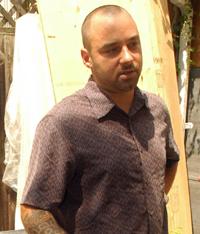Police raided Dominic Cramer’s smoke-friendly Kindred Café on Breadalbane Ave in November. He’s awaiting trial on pot charges and his lawyer says he could lose everything he owns — whether he’s found guilty or not.
Cramer’s businesses include the Kindred Café, the Toronto Hemp Company and the Toronto Compassion Centre. The latter dispenses medical marijuana in the gay village. All of the businesses could be stripped from Cramer under Ontario’s Civil Remedies Act, legislation introduced by the Mike Harris government in 2001 ostensibly to combat organized crime. It allows the Attorney General to ask the Crown under civil law to seize and liquidate “property that was acquired as a result of unlawful activities.”
Criminal defence lawyer Paul Burstein explains that while criminal cases require hard evidence and the burden of “proof beyond a reasonable doubt,” police are turning more and more to civil law, in which they merely weigh “a balance of probabilities” that a crime could occur. Any money, cars or even houses believed by police to be used in a crime, or paid for by the proceeds of a crime, could be seized regardless of any criminal charges or convictions.
In 1999 McGill economics professor RT Naylor warned that such tactics had already mutated beyond their initial intent. In the beginning, he wrote, “forfeiture could occur only following a criminal conviction.”
Burstein agrees that the spirit of legislation made sense early on — commit a crime, lose your proceeds from it — but Naylor has found little evidence that civil forfeitures work to reduce crime. Worse, he wrote, the focus on civil litigation and property could create “a dangerous erosion of due process…. It was quite another thing to seize the actual financial assets on nothing more than probable cause.”
Regardless of the moral issues surrounding pot use, the criminal case against Cramer hardly seems airtight. Toronto Police drug investigators say milkshakes sold at the Kindred Café had “traces” of THC, so the province’s Asset Forfeiture Unit (AFU) seized furnishings and equipment — TVs, couches and Xbox consoles — from the café that Cramer insists have no connection to pot.
“They’re constitutionally allowed to do it,” says Cramer’s lawyer Alan Young. “The burden is totally on the citizen to unravel what is a massive overseizure.”
Requests to the AFU for information on the status of Cramer’s café furnishings went unanswered, except for the initial officer who asked, “How did you get this number?”
Brandon Crawley, spokesman for the Ontario Ministry of the Attorney General, declined to comment on Cramer’s case or the specifics of the Civil Remedies Act. But he did point to a 2007 provincial report describing 170 cases of civil forfeiture from November 2003 to August 2007 resulting in the province liquidating $3.6 million in property, with another $11.5 million still being held.
Nearly $1 million, reads the report, has been distributed to victims of crime and police boards but Burstein says he is appalled that the Ontario government is still “sitting on millions of dollars” of seized property.
Naylor studied the trend toward civil seizure playing out in the US and was a vocal opponent of the Harris government’s introduction of the Civil Remedies Act, calling it “American-style policing-for-profit.”
A December 2008 report by the Texas Senate Committee on Criminal Justice stated, “What was once a crime-fighting and law enforcement tool has become a profit-making, personal account for some law-enforcement officials. Instances of abuse in both the confiscation and spending of asset forfeiture proceeds have increased at alarming rates.”
Burstein calls it an “eat-what-you-kill regime” but says Canada is not there yet.
“The pipeline back to the police coffers is so convoluted and indirect, I can’t imagine it would motivate any police force to develop such a policy,” he says.
But last month York Regional police chief Armand La Barge presented a report asking the provincial and federal governments for exactly that.
“There needs to be some recognition of the time and effort that goes into these investigations,” he said. “I don’t think we are unfair in asking for cost recovery.”
Perhaps not, but unfairness cuts both ways and there’s been no shortage of Canadian examples of what Naylor called “collateral damage.” A Cornwall woman, for example, stands to lose her $350,000 house in Ottawa because its tenants allegedly turned it into a crack house without her knowledge.
In Hamilton deputy chief Ken Leendertse says police have already raided seven homes in 2009 and are exploring the idea of having them demolished. He suggests it will make banks and landlords more careful about to whom they sell or lease. “It sends out a message to the criminal element, but it also makes other people pay attention.”
Cramer notes that recent drug busts in Ontario have added insult to injury, with police putting “these big signs on your front lawn saying, ‘Drug search warrant served here,’ and that’s all. It doesn’t mean you’re guilty of anything,” he says, but the chilling effect is unmistakable.
Ultimately, says Burstein, “It’s disproportionate…. The consequences of someone being wrongfully disentitled to their home or their livelihood can arguably be just as serious as wrongfully incarcerating someone.”
In Cramer’s case, he says, “I think he’s at serious risk of losing everything he owns. I’m absolutely positive that, under the Civil Remedies Act, they’re gonna go after his store.”
As he waits for his day in criminal court, Cramer is facing its civil law opposite: his property is guilty until proven innocent.


 Why you can trust Xtra
Why you can trust Xtra


